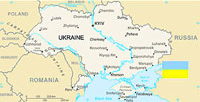[re: Ukraine] Response to Roy (JRL #79)

Re: Response to Roy (JRL #79)
Date: Wednesday April 9
From: Stephen D. Shenfield (sshenfield@verizon.net)
I am responding to Sergei Roy’s riposte in JRL #79 to my comments in JRL #77 on his essay in JRL #76. I should say first that it was not my purpose to review Roy’s article as a whole, but only to make a few brief comments on certain points. Nor did I ‘skim’ through the text. I read it through to the end and learned a lot from it. My general impression was favorable. Perhaps I should have said that more clearly in my comments, though I did say that the article was ‘insightful in many ways.’
Although Roy repeatedly mentions my name, I do not feel that his riposte is really addressed to me. Rather, it is addressed to a generic Western commentator that Roy assumes I represent. It is obvious that he has read nothing written by me apart from these brief comments. In particular, he cannot have read my paper ‘Ukraine: Popular Uprising or Fascist Coup?’ (JRL #75-76). Otherwise his tone would probably not be quite so harsh.
In response to that paper my Maidanite contacts (I don’t think I can call them ‘friends’ any more) informed me that I had been duped by Russian propaganda. Now I learn that I have also been duped by Ukrainian propaganda. Others who are trying to make sense of developments in Ukraine may find it helpful if I take this opportunity to explain my approach to sources.
Ideally I would discount all partisan sources, from both sides. The trouble is that there are so few truly non-partisan sources available. That forces me to rely to some extent on partisan sources. Nevertheless, when sources on a given issue come mostly from one side I give their claims a measure of credence ONLY on two conditions: (1) the existence of at least one supportive non-partisan source; and (2) the plausibility of the claims.
Let us apply this method to the question of a Russian military presence in Kherson Province. Most of the sources on this issue are indeed from the Ukrainian side. However, I did locate one source that appeared to be non-partisan – a report that on March 7 two buses carrying 47 OSCE monitors hoping to observe the referendum in Crimea were stopped and turned back at a military checkpoint at Chongar (Chonhar), a village in Kherson Province about ten kilometers from the border with Crimea. The flag of the Russian Federation was flying over the checkpoint. The source of the report was an unidentified person traveling with the OSCE observer mission.
It seems to me plausible that having annexed Crimea Russia should seek to secure the land bridge connecting the peninsula to the mainland – and indeed a land corridor east to the Russian border – for logistical reasons. Crimea is highly dependent on neighboring regions of Ukraine for water, electricity and other supplies. That is why Khrushchev transferred it to Ukraine. A Ukrainian blockade of Crimea is likely. Of course, plausibility is not certainty. Perhaps the Russian leadership is prepared to supply Crimea by sea and air alone for an indefinite period.
That then is why I give some credence (I put it no more strongly than that) to the Ukrainian sources on Russian military forces in Kherson Province.
I cited as an example of mendacious Russian propaganda claims about masses of refugees crossing the border into Russia. Roy, however, evades the question of these particular claims. Instead he talks about Ukrainians going to Russia to earn money and applying for Russian passports – facts that I would never think of denying. Nor would I deny that masses of refugees may set out for the border in the future, should Ukraine continue its slide into civil war. But I am not aware of any evidence that it has happened yet, so my point stands.
Psychosis may have its genesis within the disordered brain, as Roy says, but when I spoke of ‘war psychosis’ I was using the word in a somewhat metaphorical rather than strictly clinical sense. Clearly many Ukrainians are currently very afraid of a Russian military invasion and it is well known that intense fear (like other intense feelings) can distort people’s mental processes. That fear has sources outside as well as inside the individual and those outside sources surely include not only propaganda but also military and political war preparations on the part of Russia.
I did not accuse Roy of having disdain for the Ukrainian language. But it did (and still does) seem to me that his disquisition on the subject is written in such a style that a sensitive Ukrainian speaker might well feel that the author lacks respect for his or her language. From Roy’s account of the meaning that Shevchenko has for him – and surely it was Shevchenko and not the Ukrainian communists who first established Ukrainian as a literary language – it is now clear how false such an impression would be. Unfortunately, Roy failed to mention Shevchenko is his original article.
